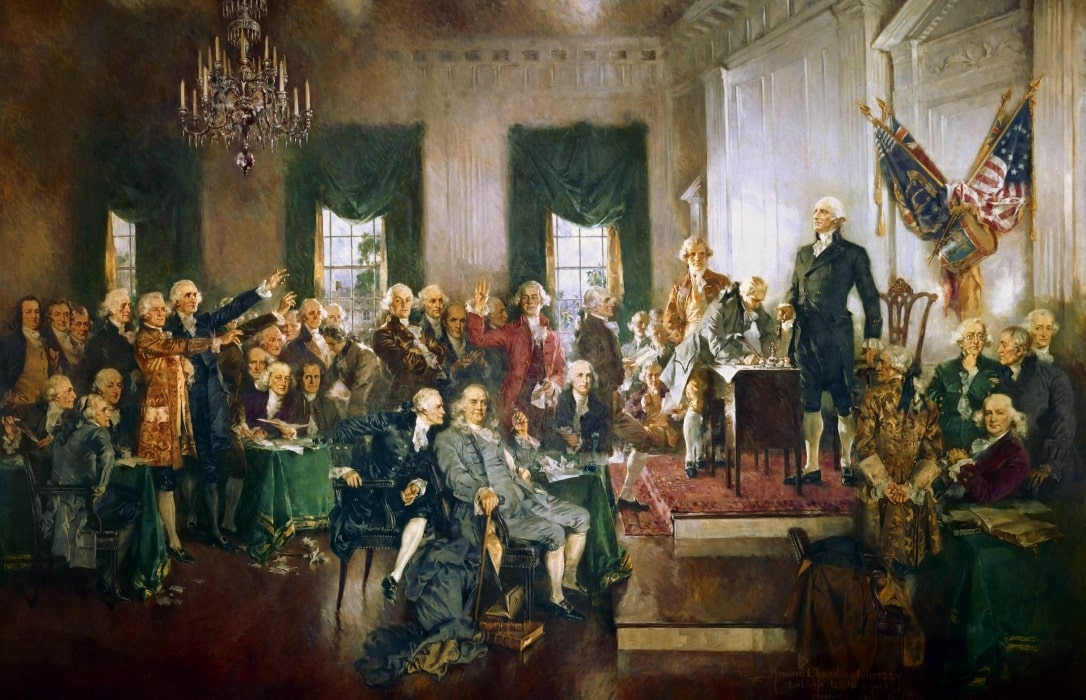September is Constitution Month, a celebration of the document produced by the 1787 Convention to replace the Articles of Confederation. Predictably, whether Republican or Democrat, there was no shortage of public effusions in its praise. Even libertarians, inheritors of the tradition of classical liberalism, are inclined to celebrate.
This is, however, a mistake. For it was precisely their faith in constitutionalism that proved its great undoing. Indeed, the tragedy of classical liberalism is not simply that it was betrayed by later generations, or that its ideals were corrupted by progressives. Its failure was more profound: it trusted the state to limit itself.
From John Locke’s faith in constitutional contracts to James Madison’s checks and balances, classical liberals, their sympathizers, and supporters believed that parchment barriers and institutional designs could restrain power. This faith proved misplaced. Constitutions did not bind rulers; rulers interpreted constitutions. And when circumstances demanded—or opportunities beckoned—the restraints were discarded. Wars, depressions, and ideological crusades all furnished pretexts for ignoring limits. Each crisis left government larger than before, and each expansion became the new normal.
History furnishes a consistent pattern. In the United States, the Constitution of 1787 was meant to establish a government of enumerated powers. Yet by the mid-nineteenth century, Congress and the courts had already stretched the Commerce Clause, sanctioned tariffs and subsidies, and tolerated wartime suspensions of habeas corpus. By the twentieth century, the rise of administrative agencies, executive orders, and judicial “interpretation” had rendered the old limits largely symbolic.
Europe followed a similar trajectory. The liberal constitutions of 1848 promised liberty of press and association, but within decades censorship, conscription, and state schooling had become pervasive. Written safeguards proved powerless against rulers determined to expand their own prerogatives. As economist Hans-Hermann Hoppe later argued, once sovereignty was vested in political institutions, “constitutional constraints are mere paper tigers.”
Some thinkers have conceded this historical lesson yet still defended the “night-watchman state” as an ideal. Robert Nozick’s Anarchy, State, and Utopia (1974) articulated the minarchist position with philosophical rigor, proposing a minimal state limited to the protection of individuals against force, theft, and fraud. This model has tempted many libertarians. Surely, a government so constrained would secure liberty better than today’s Leviathan.
Yet the lesson of history is otherwise. Even if such a minimal state could be achieved, it would rest on the same fragile foundation as classical liberal constitutions: a monopoly of coercion. Once conceded, that monopoly inevitably expands. Nozick’s state, though desirable compared to progressivism, leaves us in the same position as before: relying on the very institution that has historically undermined liberty. Over time, constitutional fences are overrun, exceptions multiply, and the minimal state grows into a maximal one.
Economist Murray Rothbard recognized this structural flaw and drew the only consistent conclusion: if liberty is to be preserved, the state itself must be abolished. In For a New Liberty (1973), Rothbard argued that every function claimed by government—law, security, infrastructure—can and should be provided by voluntary, competitive institutions. Only a fully privatized society, in which all interactions are based on contract and consent, can guarantee that coercion is minimized and liberty preserved.
Political theorist Gustave de Molinari had made the same point over a century earlier when in his essay “The Production of Security,” where he argued that even the production of security could be subject to market competition. For Rothbard, this was not utopian but simply the logical extension of liberalism’s core principles. If monopolies in commerce are inefficient and abusive, how much more so the monopoly of violence held by the state?
The history of liberalism reveals a sobering truth. Constitutionalism, though noble in aspiration, cannot secure liberty. The very act of creating a state invests rulers with powers that, sooner or later, they will abuse. Crises accelerate the process; constitutions bend to expedience. What began as government by consent becomes government by decree.
Progressive liberalism’s triumph, that is the Millian variety, was not merely the product of bad philosophy or cynical opportunism. It was the natural outgrowth of a structural flaw in classical liberalism itself: its belief that liberty could be entrusted to the state.
The survival of liberty requires more than parchment barriers or checks and balances. It requires the dismantling of the state and the replacement of coercive monopolies with voluntary institutions. The anarcho-capitalist vision, pioneered by Molinari and given systematic form by Rothbard, is not a utopian dream but the consistent completion of the liberal project.
Classical liberalism’s greatest insight—that individuals, not rulers, are sovereign—remains true. But to preserve it, we must abandon the illusions of constitutionalism and minarchism. The choice is stark: liberty beyond the state, or liberty lost to the state. Only by rejecting political power altogether can we hope to secure what the classical liberals so nobly sought but fatally compromised.

































